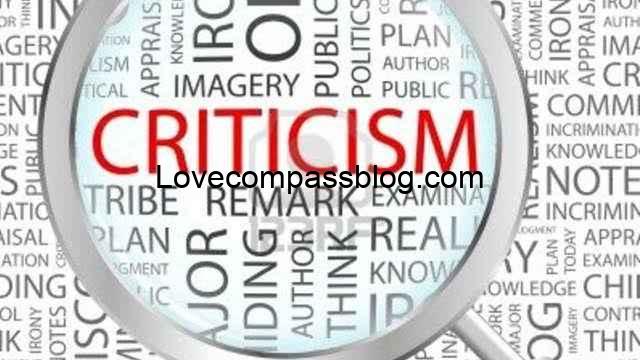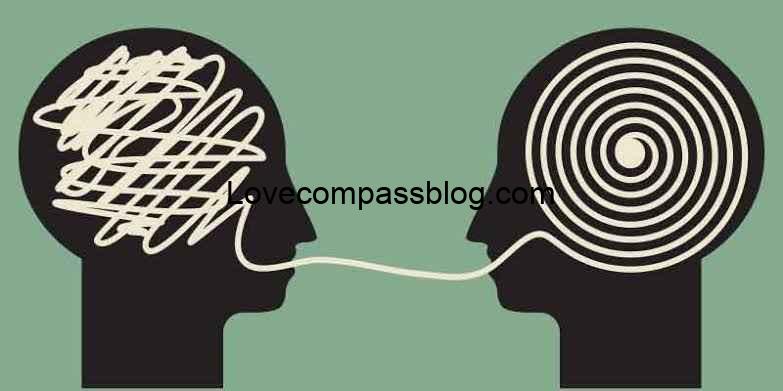How to Handle Criticism from Your Partner

Have you ever felt like every little thing you do gets critiqued by your partner? Whether it’s the way you handle household chores, communicate, or express affection, criticism in a relationship can feel overwhelming. Is your partner’s feedback aimed at helping you improve, or is it leaving emotional scars? The truth is, criticism is inevitable in every relationship, but how we manage it is key to maintaining a healthy emotional connection. In this article, we’ll dive deep into how to handle criticism from your partner, how to differentiate between constructive feedback and destructive remarks, and how to ensure that criticism doesn’t erode your self-esteem or relationship.
Criticism in Relationships

Criticism can be confusing, particularly when it comes from someone we love. In relationships, criticism often arises out of frustration, unmet expectations, or a desire for change. While constructive criticism aims to encourage growth, destructive criticism can feel like an attack on your character or worth.
Constructive feedback in relationships is about giving your partner information that can help them improve in specific areas, such as communication, behaviors, or habits. This type of criticism is meant to build, not tear down. On the other hand, destructive criticism often focuses on a partner’s flaws or shortcomings in a way that feels personal, harsh, or degrading.
Some examples of criticism in relationships include:
- “You never help around the house.”
- “You always forget to listen when I talk.”
- “Why can’t you be more like [someone else]?”
These statements generalize behaviors, making the recipient feel defensive, hurt, or inadequate. Relationship conflict often stems from how criticism is delivered and perceived. If criticism is constant, it can start to feel like an attack on a partner’s self-worth, leading to deeper emotional damage.
The emotional impact of criticism should not be underestimated. Criticism, particularly when repeated, can lead to feelings of worthlessness, inadequacy, and resentment. When criticism lacks balance—meaning it isn’t paired with positive reinforcement or praise—it can cause one partner to feel underappreciated and unloved, ultimately damaging the relationship.
Psychological and Emotional Effects of Constant Criticism

When we talk about the psychological effects of constant criticism, we’re not just referring to momentary feelings of hurt. Constant criticism can chip away at your self-confidence, causing long-lasting psychological damage. It’s often linked to increased anxiety, depression, and a loss of self-worth, especially when the recipient begins to internalize the negative feedback.
Here’s how constant criticism in a toxic relationship can affect you:
- Erosion of self-esteem: Hearing frequent negative remarks can lead you to believe that you’re fundamentally flawed.
- Emotional withdrawal: You may start to distance yourself emotionally to avoid further pain, leading to emotional distance due to constant criticism.
- Reduced communication: Fear of being criticized may cause you to stop sharing your thoughts or feelings, weakening emotional intimacy.
- Impact on intimacy: Criticism often leads to an affection imbalance, where one partner feels unworthy of love and may begin to reject physical closeness.
Over time, criticism can damage not only your emotional health but also the overall dynamic of the relationship. When a partner feels like nothing they do is ever good enough, criticism can lead to emotional withdrawal—a retreat into oneself as a way of self-preservation.
Signs of a Critical Partner

A critical partner may not always realize the damage their words are causing. Sometimes, what one person perceives as helpful feedback may come across as overly harsh or judgmental to the other. So, how do you know if your partner is excessively critical?
Signs of a critical partner include:
- Frequent negative comments about how you do things, with little or no appreciation for what you do well.
- A sense that you can never meet their expectations, no matter how hard you try.
- Lack of positive reinforcement or praise—everything is focused on what you’re doing wrong.
- They may use statements like, “Why can’t you be more like [someone else]?” or “You never do this right.”
One common concern that arises is, “Is my husband critical or am I sensitive?” It’s a delicate balance. Sometimes, we may feel overly sensitive to feedback, especially when we’re already feeling insecure. But if the criticism is frequent, harsh, and leaves you feeling worse rather than empowered to change, you may indeed be dealing with a critical partner.
Criticism can also be a form of control. Some partners may use criticism as a means of control to exert influence over their partner’s behavior, appearance, or decisions. If criticism feels constant and focused on diminishing your autonomy or self-worth, it’s important to recognize this pattern as unhealthy.
Critical behavior patterns often manifest as nitpicking or relentless negative feedback, leaving the recipient feeling drained and demoralized. These patterns can also shift the power balance in a relationship, making the criticized partner feel constantly inferior or inadequate.
How to Handle Criticism Constructively

Once you’ve identified that criticism is affecting your relationship, the next step is learning how to handle partner criticism constructively. Handling criticism requires both partners to engage in open communication and develop emotional intelligence. Here are practical strategies to deal with it:
- Manage criticism in marriage by creating a space for open dialogue. Express how the criticism makes you feel without blaming or accusing your partner. This helps avoid escalation and fosters understanding.
- Encourage constructive conversations with a partner by shifting the tone from blame to collaboration. Instead of saying, “You never listen to me,” try, “I feel unheard when I speak. Can we work on this together?”
- Focus on handling sensitivity to criticism by recognizing when your feelings are being triggered by past insecurities. Building emotional resilience can help you take a step back and process criticism more calmly.
- When dealing with nitpicking in a relationship, set clear boundaries. It’s okay to let your partner know when their feedback is becoming overwhelming or unfair. Saying, “I appreciate your input, but I’m feeling overwhelmed by the constant criticism,” can open the door to healthier conversations.
It’s important to remember that criticism, when delivered constructively, can help a relationship grow. Constructive feedback focuses on behaviors rather than personal attacks and encourages positive change without tearing down the other person.
Coping with Negative Feedback and Emotional Health
Even when criticism is constructive, it’s easy to take it personally. Coping with negative feedback requires self-awareness and emotional regulation. Here’s how to protect your emotional health while remaining open to growth:
- Emotional resilience is key. This doesn’t mean ignoring or dismissing criticism, but rather, learning to process it without letting it erode your self-worth.
- Self-worth and partner criticism are closely linked. If your sense of value is heavily tied to your partner’s approval, criticism can feel devastating. It’s important to develop a strong sense of self, independent of your partner’s opinions.
- Navigating a critical spouse involves setting boundaries and advocating for yourself. You can say, “I’m willing to hear your feedback, but I also need to feel supported and valued.”
Protecting your emotional health doesn’t mean shutting down criticism altogether—it means learning how to receive feedback without letting it define you.
Setting Boundaries and Communicating Effectively

Criticism becomes harmful when it crosses the line into constant negativity. Setting boundaries is essential to ensure that feedback remains respectful and constructive. Here’s how to deal with harsh feedback effectively:
- Communicating boundaries in criticism involves letting your partner know when their words are hurtful or unproductive. For example, you might say, “I’m open to hearing your concerns, but I need you to approach it differently so we can have a productive conversation.”
- Turning criticism into constructive feedback means focusing on solutions. Instead of pointing out what your partner is doing wrong, reframe the conversation to discuss how things can improve.
- Healthy communication in relationships is about listening actively and responding thoughtfully. When you feel criticized, try to avoid reacting defensively. Instead, ask questions to clarify your partner’s intent: “Can you explain what you mean by that? How can we work on this together?”
The goal is not to eliminate criticism but to ensure that it’s delivered in a way that promotes growth rather than resentment.
When Criticism Becomes Toxic
Toxic criticism can cross the line into emotional abuse, especially when it’s relentless, harsh, and aimed at controlling or belittling the other person. In such cases, criticism becomes a form of emotional abuse that damages the victim’s self-esteem and can even lead to depression and anxiety.
Frequent criticism on mental health can have long-term consequences, including feelings of helplessness and worthlessness. If you find yourself constantly criticized to the point where it’s affecting your mental well-being, it’s time to take a step back and assess whether the relationship is healthy.
If you’re in a relationship where emotional abuse through criticism is prevalent, it’s essential to seek help. Whether through therapy, counseling, or speaking to a trusted friend, you don’t have to navigate this alone. Rebuilding trust after constant criticism is possible, but both partners must be willing to change their approach and foster a more supportive, loving environment.
Managing Criticism to Improve Relationship Dynamics

Despite its challenges, criticism doesn’t have to damage your relationship. In fact, when handled well, it can even improve relationship dynamics by fostering better communication and emotional growth. Here’s how:
- Acknowledge that criticism affects emotional connection, but that emotional distance can be repaired with effort and understanding.
- Rebuild emotional intimacy by focusing on positive interactions and praise, balancing constructive feedback with affirmations of what your partner does well.
- Practice active listening during discussions about criticism, showing your partner that you value their input without taking it as a personal attack.
- Seek therapy or counseling if criticism has created a significant emotional rift. Professional help can facilitate more constructive communication and address underlying issues like resentment or insecurity.
By learning how to manage criticism in a relationship, you can turn moments of conflict into opportunities for growth. Rather than letting negative feedback erode the foundation of your relationship, effective communication techniques and emotional resilience can transform criticism into a tool for building a healthier, more connected partnership.
How to Protect Yourself Emotionally

In relationships where criticism is frequent, it’s easy to feel emotionally drained or defeated. Protecting yourself emotionally is crucial, particularly if your partner’s feedback is veering into toxic territory. Here’s how you can do it:
- Focus on self-care: When faced with constant criticism, taking care of your emotional well-being becomes even more important. Engage in activities that boost your self-esteem and reinforce your sense of worth, independent of your partner’s opinions.
- Seek outside support: Whether through friends, family, or a therapist, having a support network can help you gain perspective on the situation. It’s easy to lose sight of your strengths and value when someone is constantly pointing out your flaws.
- Set emotional boundaries: If your partner’s criticism is causing harm, it’s important to assertively set boundaries. Let them know how their words are affecting you and ask for a more balanced approach.
Criticism should never diminish your sense of self. By focusing on self-worth and resilience, you can remain grounded in your value while also being open to feedback that fosters growth.
Conclusion: Dealing With Partner Criticism
Now that you’ve explored how to handle criticism from your partner, remember that criticism is a part of every relationship—but it doesn’t have to be destructive. Whether it’s feedback on daily habits or more sensitive areas, how you respond to and manage criticism can make a world of difference in your emotional well-being and the health of your relationship. Balancing constructive feedback with positive reinforcement, setting clear boundaries, and fostering healthy communication will allow you and your partner to navigate criticism in a way that strengthens your bond rather than tearing it apart.
If you find yourself constantly criticized to the point where it impacts your self-esteem or emotional health, it’s crucial to evaluate the dynamics of your relationship and seek support if necessary. Healthy relationships thrive on mutual respect and understanding, and learning how to handle criticism is an essential skill for maintaining that foundation.
Now that you know this, take the first step in addressing criticism constructively in your relationship. Approach the conversation with empathy, set boundaries, and work together to create a more positive, supportive environment.




